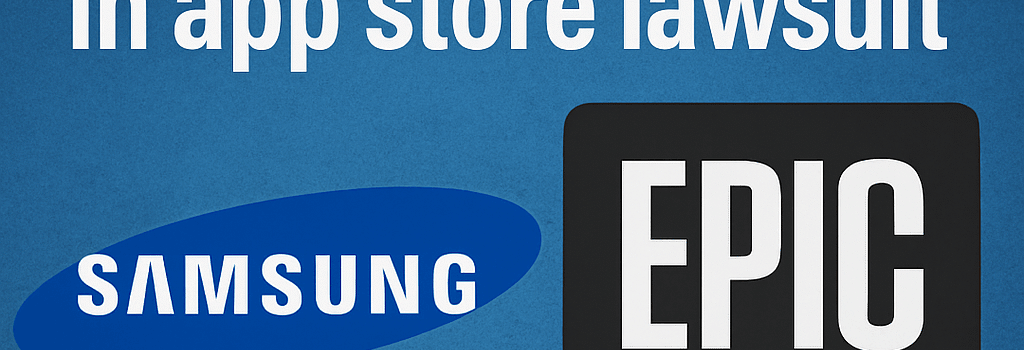Samsung and Epic Games reach truce in app store lawsuit

After a protracted legal battle over app sideloading and store openness, Samsung and Epic Games have reached a settlement just ahead of Samsung’s Galaxy Z Fold 7 and Z Flip 7 launch. The deal focuses on Samsung’s Auto Blocker feature, introduced in its Android 16–based One UI builds, which by default prevents installation of third-party app stores such as the Epic Games Store.
Background: Epic’s antitrust crusade
Epic Games first clashed with Apple and Google in 2020, when it introduced its own payment system in Fortnite and challenged the 30 percent commission model. Apple swiftly removed Fortnite from the App Store, and Epic sued under federal antitrust laws. In September 2021, a US district court largely sided with Apple, though it found Apple’s anti-steering rules unlawful. On the Android front, Epic won a significant victory in late 2023 when a judge found that Google worked behind the scenes to block competing stores, citing internal emails about “ecosystem protection.”
Technical deep dive into Auto Blocker vs Android Advanced Protection
Auto Blocker is Samsung’s hardened sideload enforcement mode, built on top of Android 16’s Advanced Protection. Key technical elements include:
- Package Manager API restrictions that reject unknown APK signatures unless preapproved by Samsung’s whitelist service
- Enhanced Verified Boot checks in the Trusted Execution Environment (TEE) that detect unauthorized loader modifications
- USB interface lockdown disabling ADB and MTP when in high-security mode
- Frequent malware scans via Samsung Knox’s on-device anti-malware engine
- Link preview sanitization preventing phishing redirects
Without sideloading, users cannot install Epic’s alternate store or its DRM-protected library. Until now, Auto Blocker shipped enabled by default on all Galaxy S24 series and newer models.
Settlement details and speculated terms
Neither Samsung nor Epic has publicly disclosed specific clauses, but Epic CEO Tim Sweeney confirmed that Samsung will address “Epic’s core concerns.” Based on Epic’s 2024 filings, likely outcomes include:
- Disabling Auto Blocker by default on new devices, with an opt-in toggle during setup
- Implementing a developer whitelist API so Epic and other vetted stores can bypass sideload restrictions
- Integrating the Epic Games Store client into the Galaxy Store ecosystem as a preinstalled partner app
“We’re pleased to see Samsung embrace a more open ecosystem for game distribution,” said Tim Sweeney. “This sets a precedent for fair competition across mobile platforms.”
Regulatory landscape and antitrust outlook
This truce arrives amid heightened scrutiny from the European Digital Markets Act and ongoing US Department of Justice inquiries into platform gatekeeping. Samsung, as an Android licensee, must ensure compliance not only with Google’s Mobile Services agreement but also with emerging EU rules requiring sideloading options and alternative payment frameworks. Legal experts suggest the settlement could influence other OEMs negotiating their own security-vs-openness balance.
Market impact and future outlook
If Samsung bundles the Epic Games Store as part of its preinstalled software, it would mark a departure from Google’s previous efforts to block such deals. Analysts at New Street Research estimate that even a modest Epic bundle could add 2 to 3 percent to Samsung’s gaming revenue through co-marketing and revenue-share agreements. For Epic, wider distribution on premium Galaxy devices could bolster Fortnite’s ARPU (average revenue per user) in key markets like Europe and South Korea.
Expert analysis
Security considerations
Dr. Priya Narayan, a mobile security researcher at SecureLabs, notes that a whitelist approach can maintain strong protections: “By using hardware key attestation and a managed signing registry, OEMs can allow trusted stores to sideload while blocking malicious actors.” However, she warns that poorly maintained whitelists may inadvertently open backdoors if not audited regularly.
Economic considerations
Antitrust attorney Marcus Liu of Chen & Associates comments: “This settlement underscores the shifting power dynamic in mobile ecosystems. Commissions once dominated by two gatekeepers are now negotiable, thanks to legal pressure and regulatory mandates.” Liu believes that smaller OEMs will watch this deal closely when crafting their own sideloading policies.
Conclusion
Samsung and Epic Games have forged a pragmatic resolution that could reshape how alternative app stores operate on Android hardware. With the Galaxy Z Fold 7 and Z Flip 7 due to ship in early August, consumers will soon see whether Auto Blocker defaults have been relaxed or if Epic’s store arrives preinstalled. This landmark agreement may herald a new era of mobile distribution, balancing security, user choice, and competitive fairness.